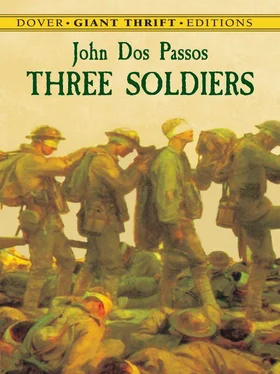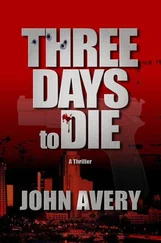“So long, Chris. I’m beating it,” said Andrews in a harsh voice, jumping to his feet.
“So long, Andy, ole man… Ah’ll pay for the drinks.” Chrisfield was beckoning with his hand to the red-faced woman, who advanced slowly through the candlelight.
“Thanks, Chris.”
Andrews strode away from the door. A cold, needle-like rain was falling. He pulled up his coat collar and ran down the muddy village street towards his quarters.
IN the opposite corner of the compartment Andrews could see Walters hunched up in an attitude of sleep, with his cap pulled down far over his eyes. His mouth was open, and his head wagged with the jolting of the train. The shade over the light plunged the compartment in dark-blue obscurity, which made the night sky outside the window and the shapes of trees and houses, evolving and pirouetting as they glided by, seem very near. Andrews felt no desire to sleep; he had sat a long time leaning his head against the frame of the window, looking out at the fleeing shadows and the occasional little red-green lights that darted by and the glow of the stations that flared for a moment and were lost in dark silhouettes of unlighted houses and skeleton trees and black hillsides. He was thinking how all the epochs in his life seemed to have been marked out by railway rides at night. The jolting rumble of the wheels made the blood go faster through his veins; made him feel acutely the clattering of the train along the gleaming rails, spurning fields and trees and houses, piling up miles and miles between the past and future. The gusts of cold night air when he opened the window and the faint whiffs of steam and coal gas that tingled in his nostrils excited him like a smile on a strange face seen for a moment in a crowded street. He did not think of what he had left behind. He was straining his eyes eagerly through the darkness towards the vivid life he was going to live. Boredom and abasement were over. He was free to work and hear music and make friends. He drew deep breaths; warm waves of vigor seemed flowing constantly from his lungs and throat to his finger tips and down through his body and the muscles of his legs. He looked at his watch: “One.” In six hours he would be in Paris. For six hours he would sit there looking out at the fleeting shadows of the countryside, feeling in his blood the eager throb of the train, rejoicing in every mile the train carried him away from things past. Walters still slept, half slipping off the seat, with his mouth open and his overcoat bundled round his head. Andrews looked out of the window, feeling in his nostrils the tingle of steam and coal gas. A phrase out of “Haner Lad” came to his head: “Ambrosial night, Night ambrosial unending.” But better than sitting round a camp fire drinking wine and water and listening to the boastful yarns of long-haired Achæans, was this hustling through the countryside away from the monotonous whine of past unhappiness, towards joyousness and life.
Andrews began to think of the men he had left behind. They were asleep at this time of the night, in barns and barracks, or else standing on guard with cold damp feet, and cold hands which the icy rifle barrel burned when they tended it. He might go far away out of sound of the tramp of marching, away from the smell of overcrowded barracks where men slept in rows like cattle, but he would still be one of them. He would not see an officer pass him without an unconscious movement of servility, he would not hear a bugle without feeling sick with hatred. If he could only express these thwarted lives, the miserable dullness of industrialized slaughter, it might have been almost worth while-for him; for the others, it would never be worth while. “But you’re talking as if you were out of the woods; you’re a soldier still, John Andrews.” The words formed themselves in his mind as vividly as if he had spoken them. He smiled bitterly and settled himself again to watch silhouettes of trees and hedges and houses and hillsides fleeing against the dark sky.
When he awoke the sky was grey. The train was moving slowly, clattering loudly over switches, through a town of wet slate roofs that rose in fantastic patterns of shadow above the blue mist. Walters was smoking a cigarette.
“God! These French trains are rotten,” he said when he noticed that Andrews was awake. “The most inefficient country I ever was in anyway.”
“Inefficiency be damned,” broke in Andrews, jumping up and stretching himself. He opened the window. “The heating’s too damned efficient… I think we’re near Paris.” The cold air, with a flavor of mist in it, poured into the stuffy compartment. Every breath was joy. Andrews felt a crazy buoyancy bubbling up in him. The rumbling clatter of the train wheels sang in his ears. He threw himself on his back on the dusty blue seat and kicked his heels in the air like a colt.
“Liven up, for God’s sake, man,” he shouted. “We’re getting near Paris.”
“We are lucky bastards,” said Walters, grinning, with the cigarette hanging out of the corner of his mouth. “I’m going to see if I can find the rest of the gang.”
Andrews, alone in the compartment, found himself singing at the top of his lungs.
As the day brightened the mist lifted off the flat linden-green fields intersected by rows of leafless poplars. Salmon-colored houses with blue roofs wore already a faintly citified air. They passed brick-kilns and clay-quarries, with reddish puddles of water in the bottom of them; crossed a jade-green river where a long file of canal boats with bright paint on their prows moved slowly. The engine whistled shrilly. They clattered through a small freight yard, and rows of suburban houses began to form, at first chaotically in broad patches of garden-land, and then in orderly ranks with streets between and shops at the corners. A dark-grey dripping wall rose up suddenly and blotted out the view. The train slowed down and went through several stations crowded with people on their way to work, — ordinary people in varied clothes with only here and there a blue or khaki uniform. Then there was more dark-grey wall, and the obscurity of wide bridges under which dusty oil lamps burned orange and red, making a gleam on the wet wall above them, and where the wheels clanged loudly. More freight yards and the train pulled slowly past other trains full of faces and silhouettes of people, to stop with a jerk in a station. And Andrews was standing on the grey cement platform, sniffing smells of lumber and merchandise and steam. His ungainly pack and blanket-roll he carried on his shoulder like a cross. He had left his rifle and cartridge belt carefully tucked out of sight under the seat. Walters and five other men straggled along the platform towards him, carrying or dragging their packs.
There was a look of apprehension on Walters’s face.
“Well, what do we do now?” he said.
“Do!” cried Andrews, and he burst out laughing.
Prostrate bodies in olive drab hid the patch of tender green grass by the roadside. The company was resting. Chrisfield sat on a stump morosely whittling at a stick with a pocket knife. Judkins was stretched out beside him.
“What the hell do they make us do this damn hikin’ for, Corp?”
“Guess they’re askeered we’ll forgit how to walk.”
“Well, ain’t it better than loafin’ around yer billets all day, thinkin’ an’ cursin’ an’ wishin’ ye was home?” spoke up the man who sat the other side, pounding down the tobacco in his pipe with a thick forefinger.
“It makes me sick, trampin’ round this way in ranks all day with the goddam frawgs starin’ at us an’… ”
“They’re laughin’ at us, I bet,” broke in another voice.
“We’ll be movin’ soon to the Army o’ Occupation,” said Chrisfield cheerfully. “In Germany it’ll be a regular picnic.”
Читать дальше












